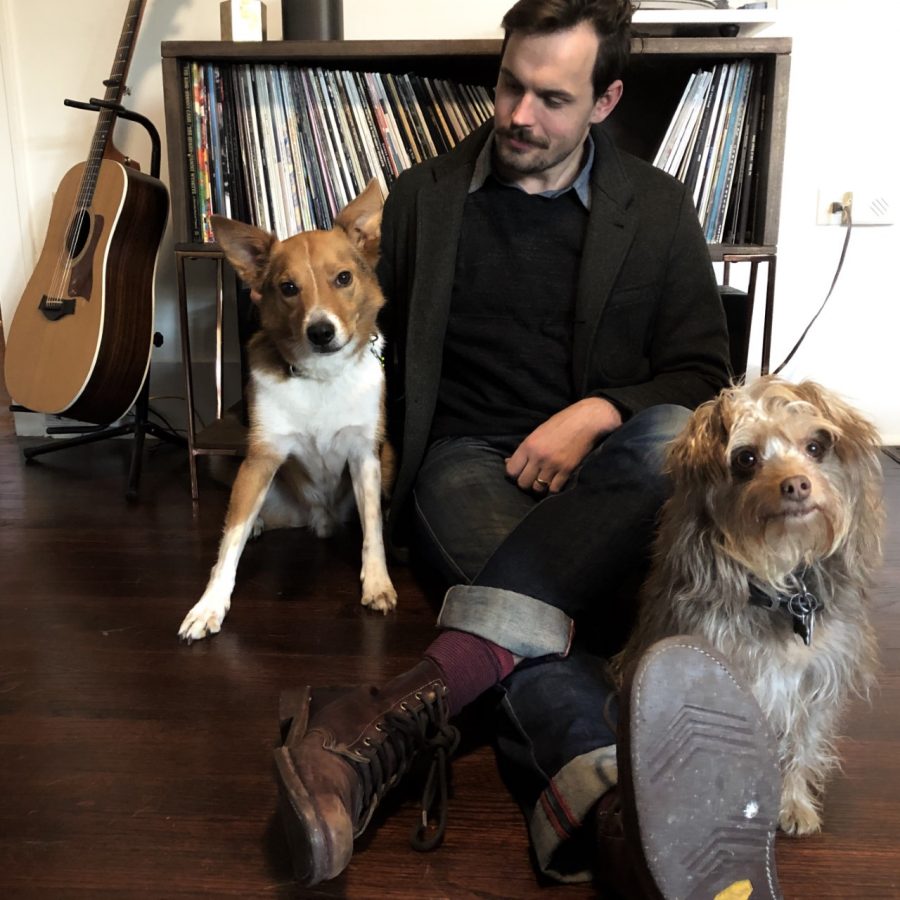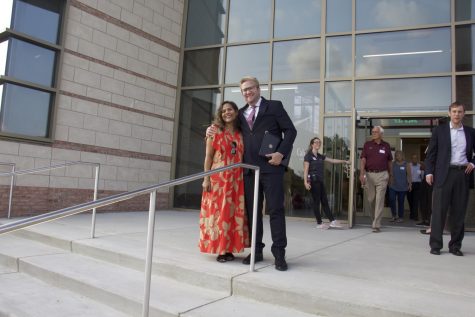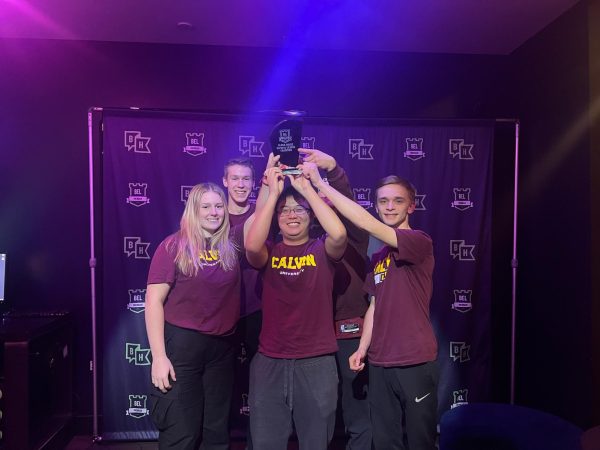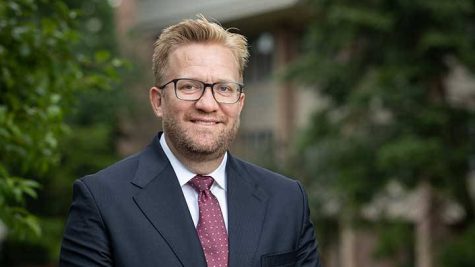Q and A with new director of student activities Jack Droppers
Jack Droppers has a background in music and theology
Jack Droppers, an avid musician, was hired as the new director of the Student Activities Office the week of Nov. 3. The following is an edited, condensed version of our interview with Droppers.
Chimes:
What will the future of SAO look like under your leadership?
Jack Droppers:
I think the main thing is to continue on the legacy that Ken has built. There’s no desire in my heart to change a ton of things. I think Ken has done such a brilliant job in the way that he set things up and the conversation series that he does and building that culture around the office.
There are a few things that I look forward to stepping into, I’d say the first day will be: ‘How can we help bring the work that has been started into the present day?’ So I think about how can we have a wider reach through potentially recording Q&A’s or shows, and how can we boost the social media presence for bringing that conversation beyond just the concert hall and the classroom. One of the other things I’m curious to see is how we can diversify the type of music and the type of movies that are brought in, and how do we create teams and groups of students that are reflective of the Kingdom of God and not just the CRC.
Chimes:
Tell us a bit about your background and what qualifies you for this position.
JD:
I love music and I love this conversation about how do we engage faithfully with popular culture. I’ve been a musician for the majority of my life. In my most recent job, I worked at a film school, so I asked filmmakers questions about how we think about movies theologically and how we view our faith as a part of the art-creation experience. I got into youth ministry right out of college and loved it, but always felt like there was something else that I was moving towards, so I went to seminary, got a Masters of Divinity. I’m an ordained pastor, so when the Calvin job came up it felt like ‘This is a long-shot, because I’m sure there are tons of applicants.’ My wife Elizabeth and I would talk and we were like ‘This could be the perfect fit.’ It’s been one of those strange fits, and to have one that sort of popped up in our backyard felt so incredibly awesome.
Chimes:
Part of the SAO mission statement reads, ‘Equipping students with the tools and experiences necessary to discern both the positive and negative themes contained in popular culture.’ What is your response to that?
JD:
I grew up in an era where much of the church was very averse to engaging in popular culture, and I understand that that can be typical in other places. I think that’s changed a little bit and I think that one of the things the SAO has done in the past and can do in the future is sort of help that pendulum swing towards the middle. We’re not simply blindly gobbling up and consuming every bit of pop culture and art we can find, but we’re also not sort of blocking ourselves off from the world and only interacting with the things that fit within our own tribe. But there can be this third space of discernment and wisdom and also looking to interact with art as a means of growing empathy.
In some ways SAO’s statement invites us to say ‘How can I interact with this piece of art or this artist in a means where I can seek understanding both about them and about myself. And I think, particularly in an era where we’re constantly inundated with things that want our attention, some of the negative effects are we don’t necessarily know what’s forming our desires when it’s forming our desires. How is it shaping my vision of the good life and pointing me towards something?
Chimes:
Talk a little bit more about the Christian faith aspect of it. How is your work going to be theologically informed?
JD:
One of the things that I bring to both this office and art creation in general is the idea of God’s final work in creation, this cultural mandate that God basically gives to the humans in the garden, this reality that they are to go forth and multiply, essentially giving them the creative tools that God has been using thus far in the creation of the world. It’s not necessarily just about reproduction, but it’s about how do we create culture, because we are born and created to be creative. I think part of thinking about things theologically, when it comes to art creation, is to view every expression of art moving alongside that creative energy that God instilled within us. Throughout the New Testament as Jesus walked around and told these parables we also have this realization that story and narrative can tell us things that our simple words can’t sometimes.
I think art can reveal things to us even about ourselves that I couldn’t say if you and I were just having coffee. If I interact with a piece of art it can move me, or shake me, or inspire me in ways that simply telling facts and words doesn’t. Jesus did this with the parables, and even some of the poets throughout the scriptures, where they invite us into this narrative that you can sort of get lost in, rather than simply just telling the historical facts. I think that shows that there’s something of value in inviting people into a story that we can’t quite comprehend, but that we can experience.
Chimes:
What kind of stories are you looking to bring to Calvin?
JD:
Calvin, within the stance that Ken has established, has this reality that they can engage with the artist as well as a person whose living out their human-ness. We get to see that a little bit when we would go to a show at The Pyramid Scheme or 20 Monroe Live, but you don’t get that as much. So I think the story that Calvin can be a part of when it invites people in is the story of not just ‘this person has made a space in my earbuds when I’m laying in bed and listening to Lucy Dacus’ album and crying about my last breakup’ or whatever it may be, but it can be that ‘this is a human that is living out their humanity through this creation.’ And so I think we can give space to that, this trade that we tend to elevate or celebrate.
That’s one story that every artist does and I think the Q&A’s and the humanizing of them does that as well. I think as well, I hope that Calvin has the space to listen to the story of whoever “the other” might be in our lives. I think art can be a great introduction to growing empathy for someone that we either disagree with or don’t understand. It can be a good starting point for people like you and I to sit down and listen to a piece of art made by someone with a drastically different worldview or world experience than we have. And I hope that we can build an environment where, not only do those people feel cared for and feel welcome and in a hospitable environment, but also that our audiences can feel curious and can grow in their empathy to whoever that “other” may be in their life. I might be that other to someone who comes to a show and I might not be for other people.
Chimes:
Lastly, tell us about your thoughts on Heffner. Who he is as a person and the work he’s done?
JD:
So I had not met Ken before the interview process. Ken is leaving in a way that exemplifies the work that he’s done here. He has every reason in the world to make this about him, and has every reason in the world to be sour about leaving not on his terms, but he’s shown such extension of grace to himself and to the community that when I encounter him I feel his deep gratefulness and his deep gratitude, and I just think that’s incredible.
I asked him, when we first sat down after I accepted the position, we were sitting in his office and I asked him ‘What’s this experience been like for you?’ And he described that his wife had printed out sheets from the SaveSAO facebook page and given them to him. He said ‘I always assume that we’re doing something good here, but that was proof.’ And I think that shows that his main concern has always been how can we be faithful to the conversation, and for him to end with gratitude and to end with thanksgiving for the season that he’s had here, I think it says loads about who he is as a person and, obviously, he has great taste and he hosts great conversations, and he’s incredibly smart and incredibly wise, but I think part of me feels incredibly grateful that he has the capacity to be thankful for his time here and be grateful for it and the community and everyone that’s come alongside of him. That they feel cared for even as he leaves I think is such a cool trait in a human.










